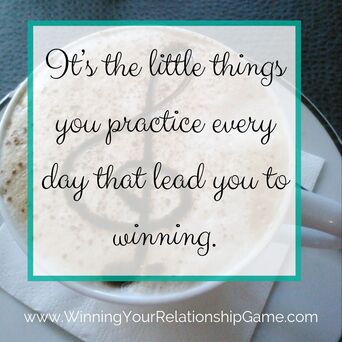|
Work, kids and all the other activities we participate in, means there’s not much time left over. When everything seems so important, we sometimes put focusing on our relationship at the bottom of our list.
Some couples think relationships are supposed to be easy. Not true! We must find the things that connect us and keep working on them. A relationship takes time and care to thrive. It’s easy to take our most important relationships for granted and put them on the back burner. Don’t let this happen to you! Use research to determine how to strengthen your bonds without much guesswork. Agreeing on relationship vision, managing disagreements with respect and creating connection are three of the most important things to keep this game going strong. Do you and your partner know what you want your relationship to look like? Once you agree on the most important values, hopes, dreams, etc. it’s easier to make a plan. Know how realistic your vision is and remember, IT WILL BE A CHALLENGE! The most important things in changing your relationship (or anything) are consistency and persistence. All relationships will have conflict and 99% of all conflict can be resolved with negotiation. Don’t let your conflicts become overwhelming. You both must accept each other for who you are and set non-negotiable differences. (My suggestion is don’t make it a non-negotiable unless it’s, well, non-negotiable!) It’s important to keep in mind that tolerance and respect is important as well. Learn to forgive yourself and your partner. But also know what you’re not ok with. Those are boundaries we need to maintain. When things get tense, we might not handle ourselves well. So, learning to manage your emotions is an important part of negotiation. Most couples have the same argument (different versions), over and over again. Don’t think that you must resolve all arguments because research shows us happy couples have “perpetual arguments.” Some won’t ever be resolved. Know the ones that are important and focus on those. Learn to listen to your partner’s viewpoint, be respectful even if you disagree and try to understand why it’s important to them. Being comfortable being uncomfortable is a skill to learn. Establish and practice rituals of connection. Do “couples” things to strengthen your identity as a couple. Take time to learn about each other on a regular basis. Go and share adventures together. Spend time periodically refreshing your couple’s vision. Remember, your relationship is a living, breathing thing and it depends on you to nurture it so it can grow! Have a great day lovelies! Allison
Comments
 I’ve gotten quite a few questions over the past couple of weeks and I’ve tried to answer some of them individually, but I’m going to answer some of the questions generally and hopefully help as many people as possible. I get this question in similar format all the time. Many times, the person asking the question has been in a relationship for quite some time. They believe things are alright and suddenly their partner leaves or kicks them out. I understand this can be devastating, especially if you didn't think things were THAT bad. Now usually the person writing the question wants to know how they can get their partner back. Sometimes the person writing the question can look back and realize this partner had never been who they needed in their life. They may even feel their partner really wasn’t capable of the depth of relationship they wanted. But sometimes, they still want them back. I'm sorry to disappoint, but I've never said I can make someone come back to a relationship! I’ve never been able to force another person to do anything. The only control any of us have is over ourselves. So, if your partner is done with the relationship, I can't tell you how to force them back. If you think there’s still hope and there’s some communication with your partner, there might be room for something to change. The first thing I advise if you’re in the wanting them back camp: Ask yourself, do I really? Do I really want them back? People will say their partner was emotionally abusive, cheating, lying, emotionally distanced, etc. …..WHAT is it you want to continue? Why do you want this to continue? Are you afraid of failure? Do you still have some love in your heart for this person? At some point, you have to accept that your partner isn’t going to be what or who you want them to be and that’s ok. Most of our angst in the world is because we want something to be different than it is. There've been times in my relationship when I thought I couldn’t take how it was. I felt miserable, unseen and unheard. What kept me here? When I rationally looked at my relationship, it wasn’t that my husband was mean or intentionally neglectful, I just wasn’t happy about what I was getting. I decided to more clearly communicate those things and guess what, things got better. If you’re anything like me, the tiniest bit of effort keeps me engaged. So, it was enough for it to make sense for me to stay. And I’m glad I did. Now if he'd been a liar or cruel, etc....I’d probably have made a different decision. We all have to decide these things for ourselves, but it’s really more about YOU. If you’re being treated disrespectfully, why do you subject yourself to this? Likewise, if your partner has left you, have you treated them disrespectfully? Did they get to the point, they could not tolerate it? I’m not saying this is the case and I’m not trying to kick you when you’re down, but if a relationship has failed, it’s part of our self-growth to learn what we can from it. So more rarely, someone reports their relationship ended, they thought they were both totally committed and suddenly, their partner ended it. Most of the time, there were signs if you look back. If your partner brings up reasons for their ending the relationship, you have to honest with yourself. Did they bring these issues up with you? Did you not take them seriously? Did you not realize how important it was to them? Maybe you can take some responsibility for that. I believe it’s all our responsibility though to communicate our wants/needs/desires to our partners in the best way we can and to make sure they understand how important these things are to us. The kicker to this is: Your partner has the right to respond or not to these requests. You cannot force your partner to do what you want them to or to not do what you don’t want them to do. Now you would hope your partner wants to contribute to your happiness (at least I do!) so they would be willing to change things within reason. Recently, I was walking around the house in my slippers. They were floppy slippers and when I walked around the house in them, they made a fwap, fwap, fwap noise on the floor. My husband said, "Those slippers are driving me crazy. Would you please get rid of them?" I said, "Of course." I threw them away and went to Wal Mart for a new and different pair. It was one small way that I could meet a need. Now that wasn't earth shattering, but how many times has your partner made a request and you resisted just to "fight for your right"? I could have told him, "No, get over it. You don't like them that's your problem. I want to keep my slippers." And I can tell you, at some time in my life, I might have reacted that way. His happiness was worth more than my slippers. Now if he had asked me to throw out my yoga pants, it probably would have been a different story! Your responsibility in the situation is to decide for yourself if you can live with it. As an example, if I had a partner who spent money irresponsibly, I would ask him to get it under control. I’d try to get his buy in to a budget, cut up credit cards, whatever I thought might help. If he refused, I’d have to determine how important it was to me. If he’s going to continue to spend recklessly, it could very negatively impact me. Now if that’s not so bad to me, I might just continue to be annoyed at his behavior and move one. If that’s unacceptable to me, I have some decisions to make. Can I separate my financial wellbeing from his? I need to find out if I’m liable for his overspending. If so, I might take measures to protect myself. I might even have to leave the relationship. You see all those responses are up to me. I don’t have to make him change to protect myself. My responsibility is to clearly articulate what I want/need or desire and how important it is to me. It’s up to him to change if he sees fit. I know that can be hard to accept just allowing them to continue to do behavior you consider harmful. The truth is though we’re all people of free will and we are not truly capable of changing another person. Usually when you get to this stage of giving ultimatums, there’s a fair amount of pain and anger involved. When we’re in those painful emotional places, it drives us to act in desperate manners. We may be making our requests by screaming, crying and berating. This behavior on our parts does not improve our communication. It actually makes it harder for our partner to listen to our actual concerns. When we let our negative emotions drive our actions, we actually get more of what we don’t want. So, pulling back on our instinctual reactions can help us be more understood. I understand how difficult this is and at times, relationships are too far entrenched in this negative behavior cycle and it’s impossible to get it out. In those cases, a relationship may end. Another situation that occurs pretty frequently is a partner is having an affair and believes they are in love with the affair partner. There is a biological basis for this so those feelings may be real. I’ve talked about that a lot so I’m not going into it here. Affairs are secretive by nature, forbidden fruit so to speak. They may see in the affair partner things they don’t see in you or things they used to see in you. The problem with this is, bringing an affair into the light, shows some of the flaws as well. It’s entirely possible the affair will be over as soon as this happens. You staying present and open to that possibility could save your relationship in the end. The more you show yourself to be clingy/a bitch/nagging/controlling whatever description they have of you, the more you reinforce their skewed view of reality. If you really want your relationship to survive this, you must keep the walls down. It’s perfectly acceptable for you not to remain open to continue the relationship as well. No one would blame you, it’s easy to leave, it’s much more difficult to stay and stick with the feelings that are going to come up. If you’re trying to rebuild after an affair, it really does pay to get professional help. It is always your responsibility to communicate what you don’t like (and what you do like) clearly and if it’s a deal breaker, communicate that too! Any situations you don’t like, you have a responsibility in them. You can accept or not accept the situation and probably a whole slew of other options as well. We very well may not like the options, but that’s trying to make reality different than it is isn’t it? So, in summary, 1. Stop trying to control partner 2. Take responsibility for your part in the situation 3. Decide if it’s worth it, or are you wanting it to be different than it is? 4. Don’t let your feelings run the show. If you need some help in improving your communication, check out my new course here. As always, hope this helps and let me know how it’s going! Allison xxoo
While you may believe you’re doing something to attract the wrong guy, that may not be the biggest part of the equation. Do you do different behaviors when you attract a good guy vs. when you attract a bad guy? Probably not. You’re probably presenting yourself in as attractive a manner as you see fit and then attraction happens.
What I mean is, attraction is an emotional response. I don’t believe we can control our emotions, but we can take 100% responsibility for what we do with those emotions. Just because I want a brownie, doesn’t mean I have to eat the brownie! That brownie might look good, smell good and promise to taste good, but I can still choose to walk away. So my question back to this person is why are you giving the wrong guy a chance to date you? There are certain characteristics that may indicate “wrong guy” status. Too often, we’re swept up in that attraction and those warning signs aren’t strong enough to get our attention. Think about the last “wrong guy”. What was the first sign you were in a relationship with the wrong person? Be honest. It was likely a long time before the last straw showed up. Why did you continue to remain in the relationship? You ought to answer this question before you take another step towards getting into a relationship again. Do you just want to be with someone so badly you tolerate things that might not contribute to your happiness in the long term? Learning your own insecurity that caused you to stay with a bad partner is imperative to making a better decision next time. Choosing a partner is definitely a choice! Do you have any idea how many people you’ll be attracted to in your lifetime? You can’t possibly be in a relationship with all of them! What’s your criteria for a “good guy”? If you’re always attracted to a pretty face, how’s that working for you? Maybe you need to know what deeper characteristics you want and look for those. Everyone has the potential to be with “good” or “bad” partners. The difference is when we’re clear about what we won’t tolerate, we don’t stay with the bad partners for long. We don’t give them chances over and over. We acknowledge what they show us and we CHOOSE to move on. We all teach people how to treat us, so when you tolerate treatment that you don’t like, you’re teaching your partner that it’s ok. Now you may complain about it or beg them to change, but bottom line, you’re allowing it. You have to set a firm boundary and then your partner can decide if they want to operate within that boundary or not. They have 100% ownership of that decision. The decision you have 100% ownership of is are you going to stay and tolerate it? Seeing warning signs and ignoring them in hopes that he’ll change, is you fooling yourself. Learn to trust yourself, see the red flags and then CHOOSE. There’s plenty of people who are good people with some really crappy flaws. The law of attraction states that we find what we’re looking for even though we might not always see it right away. Start looking for the things you DO want in a partner. You’ll find that too! Loving and respecting yourself means you live in integrity with your wants, needs and desires. Putting your attention on this will ensure that you only stick with a partner who values you as well. Sure, ending a relationship can be painful. But compromising yourself is more painful. If you want to increase your self awareness, check out my self coaching course here. It will help you get in touch with what you really want out of a relationship and create a relationship you love! Only good for you! Allison xo We celebrated together which doesn’t always happen. If you don’t know, my husband works away and sometimes we miss spending important days together.
We talked a bit about the choices we’ve made in our shared past and how it’s impacted us. We discussed some future plans too. We talked about how every decision has a cost and you have to decide if you’re willing to pay it. One of the decisions for us has been the lifestyle we’ve chosen. There’s been a big cost to us like not spending certain times together, not sharing in certain things, but the benefit has been a great payoff too. We’ve been able to travel with our children. For the past 10 years, we’ve travelled somewhere new every year. It’s made us more diverse as people, a couple and a family. We feel it’s been worth the cost. Many families spend the day to day with each other, never connecting, never really enjoying each other, taking each other for granted. I joke with my husband that we have 3 honeymoons a year. No doubt things would be very different if we’d made different choices along the way. Would they have been better? Maybe they would have been worse. I believe it taught us an appreciation of our time together. Maybe we’d have found our way to that without being apart. There’s no way to know. Now we anticipate seeing each other, and we’re sad to part, but we immediately start to plan and look forward to the next time we’re together. It hasn’t always been that way. There’s many times we’ve felt isolated and taken for granted, so it’s a constant readjustment, renegotiation, and reassurance situation. So my question for you: How connected are you and your partner right now? Are you in a cycle of non appreciation for each other? Do you look forward to spending time together? Can you talk to your partner about how you’re feeling? If not, can you move in that direction? Practice Time: If you feel disconnected from your partner, think back to the last time you felt connected. What were the BEHAVIORS that YOU were doing at that time? Were you listening attentively to your partner? Were you smiling at them? Were you holding hands and going somewhere fun together? Recreate the scenario as closely as you can. You might not feel like it, but you don’t have to. Just DO it. Even from a distance, Allison PS-Join me in my self coaching program if you want a little extra.  People who start to use alcohol or other substances don’t start out with the plan of becoming addicted. Most people feel that they can handle their level of planned use. Many times, maintaining this level of use is possible. About 10% of all people who use will become addicted. No one can tell why or when this will occur. Addiction is considered using a disease model most of the time. Once someone crosses the line to addiction, this is a point of no return. Usually treatment is the most useful course of action at this time. As reviewed in the first part of this article, substance use generally starts as experimentation due to curiosity and usually in a social situation. Tobacco and alcohol are considered “gateway drugs” and if use continues, is usually followed by marijuana use. When substance use first starts, it may be inconsistent, based on social situations usually. If drug use continues, usually with other inhaled or ingested drugs, but can run the spectrum to intravenous drug use among other methods. The physiological effects of substances are based in the body chemistry. Substances will act on receptors in the brain which control basic functions of the body. These substances create a pleasurable feeling or even a euphoria. This results in an attraction to use of the substance again in search of that same satisfying feeling. This attraction and euphoria pattern repeats itself again and again as the cycle of addiction proceeds. The next stage of the addiction process is problematic use. This stage is characterized by increased amount and frequency of use. Intoxication is actively sought. The waves of euphoria are followed by intensifying periods of discomfort. During this stage of the addiction process, the individual may begin to experience problems which are related to use. Problems may be in work, school, family, or financial areas of one’s life. If the consequences of use are not enough to interrupt the cycle of use, it may continue to the dependency stage. When someone has a physical or psychological dependence, they will experience distress when they are unable to use or attempt to discontinue use. Symptoms of dependence include compulsive use, impaired control over the amount or frequency of use, a preoccupation with the rituals of use and/or continued use in spite of adverse consequences. Early addiction stages may be referenced as a period of “romance” with the substance. Like a special romantic interest, the person may find themselves daydreaming of upcoming planned use of the substance. Physical dependence usually results as this stage progresses. At this point, euphoria is no longer experienced and use is required for the person to feel normal. Repercussions of use will continue in the social areas of the user’s life. Within the addictions process, individuals may move from problematic use to abstinence and back over time. Once someone has reached the dependence stage, it is commonly believed that they can never be cured and must maintain abstinence or return to problematic use. Most professionals feel that once the dependence state is reached, the person will not be able to return to unproblematic use. While many theories of the etiology of addiction exist, we do not know why or how people will become addicted. Most likely, there are multiple factors that contribute to this outcome. These factors include psychological stressors, environmental status, or physiological states. Again, if you or someone you love is struggling with problematic substance use, reach out for help. Find a local resource or check the SAMHSA website at: https://www.samhsa.gov/find-treatment Allison  When working to make change, it can be helpful to explore the intention in as many different sensory capacities as possible. Writing is one of those activities that requires thought process and then physical action tied to that process. This makes writing an effective method of expanding and reinforcing learning. Writing is a reminder of the goal. Often there is a situation which has created a significant amount of pain for you. For instance, perhaps you have been arrested for driving under the influence. This is usually a source of pain and shame. As time heals all wounds, over time, the memory of this pain dulls. Therefore, there is value in recording this pain. At some point in the future, you’ll start to feel that “it wasn’t that bad”. The written account will serve as a reminder. This can apply for many types of behavior we want to change. Writing can clarify the goal. At times, our thoughts can be “foggy”. Writing and review can help us become more focused on specific goals regarding that change. Written thoughts can give you clues on where to focus attention. I like to use a game of “whys”. So, an example might be: Why do you overeat? Because I’m bored. Why are you bored? Because I have nothing to do. Why do you have nothing to do? Because I can’t afford to do anything. Why can’t you afford to do anything? Because I’m disabled. This example leads to multiple potential interventions that can be addressed. A person may be disabled, but they can find inexpensive or free things to do. Or perhaps they need to deal with the grief surrounding being disabled and the limitations that brings. Writing can provide insight. Insight means gaining an accurate and deep intuitive understanding of self. Often, writing illuminates things about our ourselves that we hadn’t realized. When you commit to journaling even briefly every day, it can lead to insight that has not been realized until this time. This can cultivate further focus for growth or even for more writing. Often, people have had an unsuccessful attempt in the past to journal consistently and this creates a resistance. If this is you, try a prompt that only requires one or two words. People can usually make the commitment to do this as a minimum. My own journaling practice focuses on 5 areas of my life: Relationships, Health, Career, Abundance, and Gratitudes. I do a quick summary of each of these, a few sentences. If things are great, GREAT! If things are a bit “jangly”, I go into how I might improve that area. Since personal writing is a direct reflection of yourself, you’re bound to learn something. Give it a try and let me know how it goes! And remember, you are lovely! Allison  Outcomes are goals that we strive for. As a culture, we are pretty addicted to meeting goals. We’re taught how to set goals that are SMART. (Specific, Measurable, Attainable, Realistic and Time Limited). Which is great if you actually could set a goal like that! Believe me, when I worked with an agency, there was like 1 person out a 100 who could actually set a goal that the auditors thought was SMART. In your relationship, what’s your goal? Is it to fight less? Not fight at all? Is it to be “in love” again? A lot of times, I have people say, “I want us to get back to where we used to be.” Those are all pretty big goals. What happens when a goal seems out of reach? When we look at it and it seems impossible. Fighting less might seem like a great goal, but what are the steps it takes to get there? Do you know the steps? If you knew and could do the steps, wouldn’t you have already done them? When we start doing these little steps, we get frustrated because we feel we should be at the goal already. We feel shame and blame we’re not meeting what we see as our desired outcome. We also fail sometimes. I can’t tell you how many couples are making good progress and they slip and have a huge row and they feel like they’ve lost all the progress they’ve made. All that can make us give up and stop going for it. It seems like an exercise in futility, it’s too difficult, or we just aren’t capable of doing it. Well, I’d like to reassure you. When the end game seems impossible, it’s time to focus on the process, not the outcome. Using a football analogy here: If your desired outcome is to win the Super Bowl, but your team has not learned to run a play yet, you better focus on running the play! Not only do you need to learn to run the play but you need to become great at it! You are going to run that play over and over until it’s second nature. You’re going to know that play inside and out. At first, the play is going to be awkward. At first, the whole team isn’t going to be good at it. There’s going to be a lot of failures in making the play. But eventually, your team runs a great play! They win a game, then another and before you know it you’re a Super Bowl contender. That outcome that seemed so impossible is now within reach. But only after you’ve mastered the process. There have been times in my relationship when I’ve felt happiness wasn’t possible. I didn’t think it’d ever happen again. That seemed like an outcome that was too much to hope for. Turning that around took a focus on the process. The processes of a happy relationship, (I call the pillars) are compassion, communication and commitment. Making the little decisions every day that align with these qualities is what got me closer to the end goal. I had to be kind when I didn’t want to be. I had to decide to stay just one more day when it would have felt great to walk out. Talking about things that made me vulnerable created intimacy little by little. I focused on the process because I didn’t know how to get to the outcome I wanted. I was so far away from it, I needed a telescope. By paying attention to the process, I moved closer and closer, with consistency and persistence, until I could see happiness on the horizon. I tried to stay focused on my own behaviors, not my partners. By continuing on, we’ve found our way to a place of happiness I don’t think we ever imagined. We’ve now passed our 20th anniversary and we enjoy each other more now than we ever did. Do we still disagree? Yes. Do we still annoy each other? Yes. We fail all the time. But we focus on the process. Practice time: What is your desired outcome? What processes do you need to get there? It’s the little things you practice every day that lead you to winning. What is one process you can commit to today? Consistency and persistence are mandatory! Let me know what you decided. Comment below, I’d love to hear from you! Cheers to the process! Allison PS-Did you know I have a Self Coaching Program? It's available here. Now, recall the last time you got angry at your partner about something. Was it over the dirty laundry left in the bathroom floor? Now, in the grand scheme of things, that dirty laundry really isn’t’ that big a deal is it? Get curious about what’s really going on. What’s really got you going is the meaning you’ve placed on that situation. So does dirty laundry on the floor even though you’ve asked a million times mean that you’re not being heard? Does it mean that your partner doesn’t care about what’s important to you? Does it mean you feel disrespected? Apply some curiosity and you’ll find a deeper meaning.
Pretty soon you’ll understand why you’re so riled up. The dirty clothes serve as evidence for something that’s meaningful to you. The ability to communicate in deeper terms allows you to more truly express yourself to your partner and it allows them to know you more and more. Our intimacy grows when we can share our inner selves more with our partners. Maybe even more important is recognizing that the same way you get wrapped up in something insignificant, applying deeper meaning to it, is your ability to recognize the same thing happens to your partner! This is where curiosity helps again. When your partner is angry at you, can you get curious about the deeper meaning? What’s on the surface is only minimally related to the deeper attachment need, our need to belong. If you can tease out the deeper meaning for your partner, you can help to soothe the part of them that’s feeling a bit shaky. What a wonderful thing to be able to do for each other. Practice time: OK, cast your mind back to the last time you got irritated or flat out mad with your partner. What was the surface issue? Did it really mean that much? Or was there a more significant, deeper, truer meaning? What was it? Can you initiate a conversation with your partner and let them know what was actually happening for you? This isn’t to resolve it, it’s just to let your partner know you better. If you want bonus points, think about the last time your partner got angry with you. Look beyond the surface issue and get curious about the deeper meaning. Can you initiate a conversation about that with your partner? You might just end up knowing them better too! Curiosity might have killed the cat, but it saves relationships! Stay Curious Lovelies, Allison I want you on my email list! I'll send you 4 videos with some great, practical relationship tips and share so much more! SIGN UP HERE  All Couples are going to disagree. Usually, we have not had training in how to fight fairly and so, fighting becomes a free for all to see who can hurt the other’s feelings the most. If we can adhere to the rules of fair fighting, our arguments can be much more productive experiences. Rules for Fair Fighting 1. Identify the problem. If you can’t identify the problem, is there really anything to fight about? Is one of the participants simply irritable? Once you have isolated what the issue is, follow the rest of the rules and avoid the fouls! 2. Attack the problem, not the person. If an argument gets personal, it’s an indication that you’ve lost sight of rule #1. Attacking the other participant is a sure way NOT to gain agreement. 3. Listen to each other. Adults listen to views that are different than their own. Listening is a sign of respect, not submission. Take turns with a timer on if you need to. 4. Take care of each other’s feelings. Assume that you are each responsible for the other’s feelings and ensure that you do and say nothing that is damaging to the other person’s feelings. 5. Take responsibility for what you say and do. If you do lose control and say something “foul”, then own your behavior; apologize sincerely and do an act of kindness to make amends. Each of the behaviors below is considered fouls. These behaviors indicate fighting behavior that is damaging to the relationship. FOULS: Blaming Getting Even Hitting Making Excuses Name Calling Bossing Not Listening Teasing Put downs Threats Chances are you’ve been in relationships where the fouls above have been part of the fighting. While you can only be responsible for your actions, you also owe it to yourself to set limits when others use these fouls with you. Arguably yours, Allison PS-I’d love for you to follow me on the socials! My links are in the footer of my site.  The question I want you to consider today is how good are you at listening? Do you really hear your partner? Most of us are pretty good at listening until we hear something we don’t like. Then we stop listening and begin to mentally draft our response. Learning to listen well is a terrific Winning behavior in a relationship. I’m going to walk through a process with you for speaking and listening and hopefully, you’ll give it a try with your partner. In every communication, there’re two roles to play. One person is the speaker and one (or more) person is the listener. We communicate in multiple ways, with words, gestures, tone and body language. In fact, all behavior is communication. There is no NOT communicating. It’s impossible not to communicate something to the person we’re with. Unfortunately, often the message received is not the message sent! If the first thing out of your mouth makes your partner defensive, your communication has failed. If the goal is for your partner to hear what you’re saying, you’ve got to be more aware of your own communicating behaviors. Remember that you can only control your behaviors, so presenting information in a way that it will be received is YOUR responsibility. Now I always think it’s best to have a plan when you’re not sure about something. It’s also great to give yourself structure when there’s something that’s emotionally charged. You don’t want all those feels to take over your communication. My favorite structure for communication is from Imago Therapy. Structure can feel awkward at first. But believe me, it helps you take that necessary pause to consider your communication. If it helps, isn’t it worth feeling a bit awkward? So this is how it goes: The speaker’s responsibility is first to “make an appointment”. This isn’t necessarily a formal appointment. It could be just asking, “Is this a good time to talk to you?” How many conversations have gone down the tubes because one of the parties was tired or hungry or in the middle of their favorite TV show? So step 1 of successful communication is ensuring it’s a good time to talk. This may seem silly, but isn’t that the ultimate in respect? What do you do if your partner says, “No?” This is a request, not a demand (ever notice most of us don’t do so well with demands?). A request can be declined without consequence. So a “no” doesn’t mean you stomp off and slam the bedroom door. It doesn’t mean you take it as a rejection and blow up. It also doesn’t mean your partner can avoid the conversation forever. If there is a no, ask when there might be a better time. Set an appointment. Step 2 for the speaker is to state what you want to talk about using nonviolent language. Focus on your feelings and don’t tell your partner’s story. Things to stay away from are “you never”, “you always” and anything insulting. Generally it’s a good idea to stay away from the word “you” altogether. Remember writing things out is a great way to practice! I always suggest my couples do this at least a few times to get a feel for it. You will catch on much quicker than you think. Step 3 for the speaker is to not trigger your partner’s defenses. This means your words cannot be critical or accusatory. Your words should not be sarcastic, or delivered with a contemptuous tone. You will have to carefully select your words. It’s a good idea to practice the delivery looking at yourself in a mirror. You can see so much in your expression that you’re mostly unaware of when you look in a mirror. Remember this is growth, so expect pain! Step 4 for the speaker is to stay on topic. You can’t solve every issue with one conversation. Your partner also doesn’t need a full accounting of every ill you feel they’ve done you. If you tend to be a kitchen sinker, time for a behavior change! Learn how to be really effective at this and you can resolve issues, but only one at a time. As your confidence builds you’ll have success, and you’ll be more relaxed with each other. Then you’ll find this much easier! Step 5 for the speaker is to maximize agreement. Every few sentences, you want to gain agreement from your partner. Make sure they are comprehending what you said by having them mirror it back to you. This helps catch misunderstandings early on. Remember most of us listen until we hear something we don’t like, then the listening stops. Frequent checking in keeps both of you in the moment and focusing on the message being delivered. The last step for the speaker is to thank your partner for listening. OK, did you think that was challenging? You might not think so, but it really is. If you think that was tough, read on for the rules for the listener. Rule number 1: Listen only. No speaking except to mirror agreement/understanding. Don’t interrupt. If you feel something rising up in you that wants to retort, focus on the words your partner is saying. Listening without reacting doesn’t mean you agree or give up your right to respond. Do you ever watch Judge Judy? Sometimes they have a case there between people who were in a relationship that’s now gone bad. One person starts talking and the other cannot control themselves, they speak out and interrupt. Judge Judy jumps in and says, “Be quiet or you’ll be out of my courtroom”. You can laugh about that and shake your head, but how often do we do the same thing to our partner? The only problem is we don’t have Judge Judy to intervene, so our partner has to fight for their right to be heard. Pretend you have Judge Judy sitting in front of you. The second rule for the listener is to mirror back what was heard. You do this by saying, “What I heard you say was…..” You can repeat exactly what your partner said or you can paraphrase, but don’t add your own spin to it. You’re not allowed to introduce your own thoughts to the discussion. You’re only allowed to ask two questions, one is, “Did I get that right?” The other question is the third rule for listeners. The question here is “Is there more?” You then allow your partner to say more about the issue if they have more. You repeat steps 1, 2 and 3 for as long as your partner needs to speak. If they are sticking to the one topic rule, then it shouldn’t take more than one or two times asking that question to get to the end. The speaker and the listener should agree that they are both understanding (doesn’t mean agreeing necessarily) the issue from the speaker’s perspective at this point. When the speaker is done rule 4 is to summarize. After summarizing, make sure you got it all, by asking, did I get it all? If not, go back in for some clarification. The speaker and the listener should again agree that they both understand. The fifth rule for the listener is to validate with empathy. Validation does not equate to agreement. Validation means if you really heard your partner, you can begin to see their perspective. It might be different from yours. You might demonstrate this by saying, “I can see why you’d feel that way because…..”; Or, “I can see why you’d react in that way........” Developing empathy and validating your partner shows respect for their feelings. It doesn’t mean you think they are right or wrong. And the last rule for the listener is to thank their partner for sharing. Are you wondering how you can use this if you’re playing alone? The same way it’s outlined here. If you approach or respond to your partner in this way, do you think your discussions are going to go better? I’m betting they will. Remember, behind every complaint is a deep personal need. That goes for both you and your partner. Let me show you this in action. Speaker(S): Is this a good time to talk? Listener(L): Sure S: I’d like to share my feelings about our laundry challenges, OK? L: Sure S: I believe I work hard, just like you, and we should both share household chores. You know what I mean? L: You and I both work hard and you want us both to work together at home too. Did I get that right? S: Yes. L: Is there more? S: Yes. I’d like for us to come to an agreement on how we get our laundry chores completed. It seems that it never gets DONE. You know what I mean? L: You’d like for us to agree on some sort of end point for getting the laundry done. Did I get that right? S: Yes L: Is there more? S: Yes, I know it never really gets done, but I really get frustrated when I gather everything up and get it washed and then laundry comes from somewhere and needs to be done urgently. You know what I mean? L: You are bothered when you think the job is done and then find it’s not. Did I get that right? S: Yes L: Is there more? S: Yes. I think the problem is having more than one place where dirty laundry is held. I’d like to suggest we establish a formal place, or two, that is where dirty laundry stays until wash time. Then I can get it all done and not have to worry about being pressured to get that urgent thing washed. You understand what I’m saying? L: I think so. You’d like to have a couple of laundry holding areas so you can always locate the clothes that need to be done. Then you aren’t stressed out because there’s that one more load that you didn’t know about. Did I get that right? S: Yes. L: Is there more? S: Just that I’d like to agree on those holding areas now and agree to use them exclusively. I can get a hamper for the spare room where you change if you’ll agree to put your uniforms in there every day. Does that make sense? L: Yes. You want all the laundry in that hamper or in the bathroom hamper and you’d like me to ensure my uniforms go in one of those places. Did I get that right? S: Yes. L: Is there more? S: Yes. But first, is that agreeable? L: Yes, I have no problem with that. S: OK. It seems that I’m taking on the responsibility of getting the urgent laundry done now. I don’t think that’s how it should be. If the hamper idea doesn’t work, I’m relinquishing responsibility of washing suddenly located uniforms. You know what I mean? L: You feel like you shouldn’t have to scramble to do my uniform if I don’t get it into the hamper. Did I get that right? S: Not exactly. I’m saying, you have to own that. L: OK, so you’d like for me to do my own urgent laundry rather than you doing it. Did I get that right? S: Yes. L: Is there more? S: No, that’s it. I’d just like to know if you’re in agreement or do we need to make another plan? L: No, I’m really fine with that. It stresses me out to when I find my dirty uniform so if it relieves both of us of that, I can be diligent about putting it in the hamper. S: Thanks for listening. L: Thanks for sharing. OK, that’s a lot isn’t it? But how many silly arguments have been born out of a similar issue???? Many, many, many, at least in my house! Are you resisting the formal structure of this script? Remember, your best attempts at communication have gotten you where you are. It’s time to look at some more productive behaviors. Having a structure for communication makes it a safe place for both you and your partner. I promise you, if your relationship is going to change, you’re going to have change. Adopt winning behaviors, your relationship will improve. Practice Time: Make a commitment to speak or listen according to this script for the next two weeks. Use the script for either every day for the next two weeks. Follow the script even if your partner isn’t playing with you. Feast on your success and I’m confident you’ll see some change in your relationship. Sign up HERE for my email list and I’ll share some great relationship tips with you! I'm listening ;-), Allison |
Helping You
|





 RSS Feed
RSS Feed

